“Man is the only creature that refuses to be what he is.”
Why do we train? Why do we diet? Why do we take supplements? Why do we join gyms? Why do we invest time, money, energy and effort into all thing’s strength, health and fitness-related? What motivates us?
Our communal motivation is a dissatisfaction with our physical self. A dissatisfaction so profound we are driven to do something about it. We refuse to be what we are – we seek to metamorphosize from ugly earthbound caterpillar into gorgeous celestial butterfly. Our dissatisfaction spurs us to start a diet, join a gym, jog, hire a personal trainer, start taking supplements…we refuse to be what we are. It is a trait buried deep in our DNA.
Success is another matter. Effort is no substitute for success. Success is dependent on a combination of elements, i.e., the soundness of mode or method selected, the degree of sustained effort brought to bear, the ability of the trainee to exert the degree of intensity required to trigger hypertrophy.
Is the transformative acolyte able to perform progressive resistance and cardio on a consistent basis and regular basis and in a periodized manner?
Does the trainee have the determination to eat and drink power foods, eschewing poor or counterproductive food choices?
Optimal training and eating requires discipline and preplanning. Fuel muscle growth with quality calories and hardcore lifting. Melt body fat with clean eating and consistent cardio.
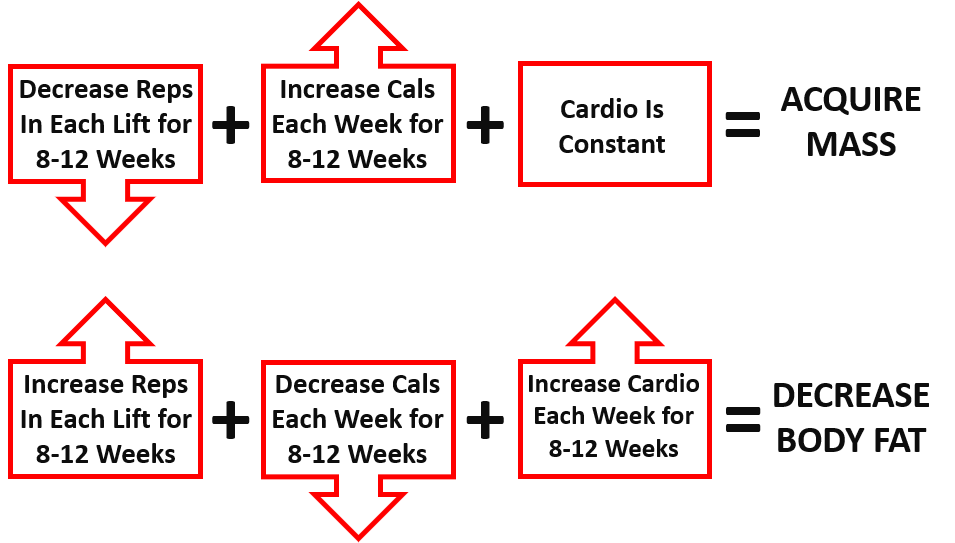
Four disciplines should be proportionally practiced. Optimally, all four disciplines, resistance training, cardiovascular training, nutrition and brain-train are given equal billing and practiced in a balanced and even fashion. By eliminating or ignoring one or more of the four core elements, results will be disproportionately deficient.
The Purposeful Primitive system is designed to operate as an integrated whole: the sum total of results is greater than the logical sum of the unassembled parts. When used in unison, after a few weeks of total adherence, a physical synergy takes hold and results occur at an accelerated rate. This phenomenon only occurs (but predictably occurs) when the trainee hits that magical sweet spot, that balance point where all the disciplines are in place and practiced with persistence and evenhandedness.
We do not subject ourselves to restrictive diets, train with manic intensity, engage in ferocious cardio, deprive ourselves and exert ourselves in order to stay the same. In return for our concentrated and comprehensive efforts, we expect improvement in physique, health and performance. We seek dramatic improvement - not infinitesimal or barely noticeable changes, we want extraordinary results in return for our time, money, sweat, blood and herculean efforts. We seek radical physical transformation.
The Tao of Transformation
The Iron Tao has two defining characteristics - yin, yang.
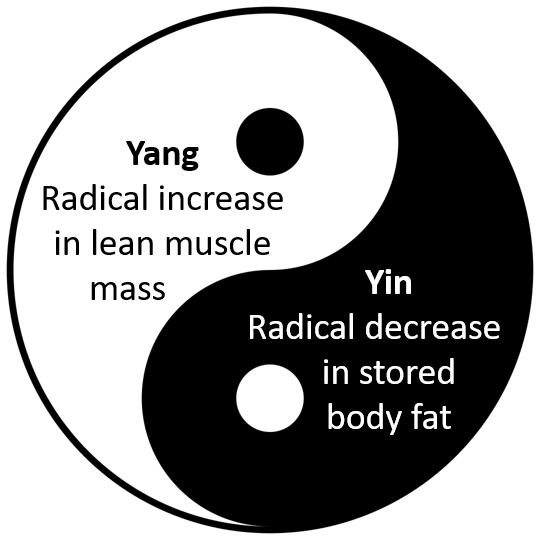
A trainee can be said to have undergone a radical physical transformation when they successfully construct a significant amount of new muscle and successfully melt off a significant amount of body fat. Muscle is constructed using power training to become stronger. Fat is melted combining cardio and diet. When the athlete becomes dramatically leaner and stronger, athletic performance automatically improves -and to a dramatic degree, regardless the sport or drill.
How do we attain a radical physical transformation? How do we add lean muscle mass? How do we lose body fat? There are four interrelated disciplines that need be executed in a balanced, “periodized” fashion. Each discipline has pre-planned goals that are pursued simultaneously.
The Four Transformative Disciplines
The Levers of Progress
Builds functional, usable muscle that equates to more raw strength allowing strength to be maintained late into life. This means that we can retard the detrimental degradation of aging and retain function and mobility far later into life if diligent in our practice. The use of full range-of-motion movements strengthens tendons, ligaments and muscle insertion points to make the trainee more injury resistant and thickens and strengthens bone, fighting osteoporosis.
We need train our “internal plumbing” with the same regularity and intensity we use to train our external musculature. Targeted training of these internal muscles strengthens and improves their functionality while increasing organ capacities and capabilities. To obtain results from our cardiovascular training efforts sessions need to generate a pure physical effort sufficient enough to trigger the adaptive response.
Our goal is to establish critical thinking as it relates to nutrition. This approach puts the science back into eating and relates a collective consensus of nutritional modes and methods used by professional athletes, elite spec ops, MMA fighters and competitive bodybuilders to accelerate workout recovery and muscular growth. Eat nutrient-dense power foods - seasonally appropriate, locally sourced produce and proteins from the farmer’s market and butcher-shop. Get rid of empty calories and sugar (download guide "Sugar-Is it the new enemy?")
By subjecting the body to intense physical effort a trainee can trigger the "fight or flight" response. The body awakens in order to cope with the severity of the training effort. This state can be achieved with astounding regularity using high intensity progressive resistance and cardiovascular training. Learn and master autosuggestion, berserker psyche, meditational techniques for long-term adherence. This is the subtle psychology of the transformative process.
Cut Through The Training Confusion!
Learn how to create a Transformative Plan using our FREE Step-by-Step E-Course. Create your own personalized Transformative Template whether a new or experienced trainee merging your progressive resistance, cardio and nutrition goals!
Human Performance: The Five Bio-Motor Abilities
How is human performance improved upon? Systematically improve performance within each of the five bio-motor benchmarks.
Strength - Become Stronger
Speed - Become Faster
Endurance - Improve Endurance
Agility - Improve Agility
Flexibility - Become More Flexible
How is systematic improvement within each bio-motor attribute attained?
Create a strategy for improvement for each bio-motor attribute. Set battle-tested strategies into a timeframe and set about achieving the overall goal by attaining a series of incremental weekly mini-goals. Be aware that there are subdivisions, shades and degrees, within each of the bio-motor attributes. The extremes within each bio-motor skill demand different improvement prescriptions.
Bio-Motor Bar Graphs - Detecting Nuance
Within the five bio-motor attributes there exists a range, shades, types and degrees of effort that flow from one extreme to the other extreme. For each bio-motor skill a bar graph can be created: the extreme left of each graph is pure white; if your eyes follow the bar graph, left to right, the pure white on the extreme left becomes increasingly grey and totally grey in the exact middle. The grey becomes increasingly darker as grey morphs into black and finally the blackest of black on the extreme right. We would add a 6th attribute of Psychological Recalibration.
Strength
Extreme Left
Powerlifting
Absolute Strength
Middle
Olympic Weightlifting
Explosive Strength
Extreme Right
Kettlebell or MMA
Sustained Strength
Speed
Extreme Left
40-100 Meters
Pure Sprint/Burst
Middle
100-400 Meters
Outer Sprint Limit
Extreme Right
400 up to 800 Meters
Strength/Endurance
Endurance
Extreme Left
Marathon/Triathlon
Ultra-Endurance Flow State
Middle
800 Meters to 5K
Steady State
Extreme Right
MMA Style Training
Intense Muscle Contractions
Agility
Extreme Left
Defensive Back
Speed-biased
Middle
Linebacker
Balanced
Extreme Right
Nose Tackle
Strength-biased
Flexibility
Extreme Left
Yoga
Flexibility in Its Purest
Middle
Dance
Flexibility with Power
Extreme Right
Rock or Wall Climbing
Effort + Cardio + Flexibility
Psychological Recalibration
Extreme Left
Psyche for Training
Instantaneous
Middle
Modifying Habit Force
Sustained Discipline
Extreme Right
Long-Term Adherence
Solar Power - Self-Sustaining
Practical Programming
The competent programmer creates training regimens designed to increase power and strength and stamina while preventing or rehabilitating injury. The first duty of the able and facile programmer is to determine the trainees exact needs. After absorbing the facts, data and idiosyncratic differentiations, the programmer constructs a training template, one that will enable the trainee to morph from what they are into what the seek to become. We do so incrementally and methodically; “creeping incremental-ism” deposits the athlete at the predetermined goal at the end of the allotted periodized timeframe – essentially transformed. (See sample periodization for lifting and cardio below)
No one trains, diets, performs cardio or goes to the trouble to plan and periodize in order to stay the same: we train because we want to improve our physique and we want to improve our performance. One sure-fire way to improve performance is to improve the body. When we become stronger with increased stamina, when we are leaner and more muscular, performance in any and all athletic benchmarks automatically improves. When we look at the individual athlete, there are questions that need to be posed….

All elite athletes periodize: periodization sets goals into a timeframe then works backwards to a starting point. The periodized athlete ‘reverse engineers’ a plan based on the intended result and the amount of time allotted. To understand periodization we start by quantifying time….
- Macrocycle is the overall length of the periodized cycle.
- Mesocycle is for a single month.
- Microcycle is for a week.
The most basic form of periodization is linear periodization. The classical linear periodization model is a 12-week macrocycle that contains three, four-week mesocycles and twelve one-week microcycles. Categories are created and placed in vertical columns. Each week has replanned performance goals for exercises. Periodization tactics need not be confined to weight training. In a nutshell, the way to periodize or “cycle” any lift is as follows….
- Create a realistic goal
- Establish a realistic timeframe
- Reverse engineer: work backwards with a calendar
- Place realistic goals within a specified timeframe
- Work backwards to establish weekly benchmarks
- Every 3-4 weeks alter the variables in anticipation of stagnation
- When instituting changes, make change dramatic, not minor
Below is a sample of an 8 week beginner periodized cycle. As a total beginner with limited time to weight train a twice a week training regimen concentrates on doing three powerlifts to exclusion. The three lifts are performed in two 30 minute weekly sessions. We project and track five inter-related categories: bodyweight, bench, squat, deadlift and cardio.
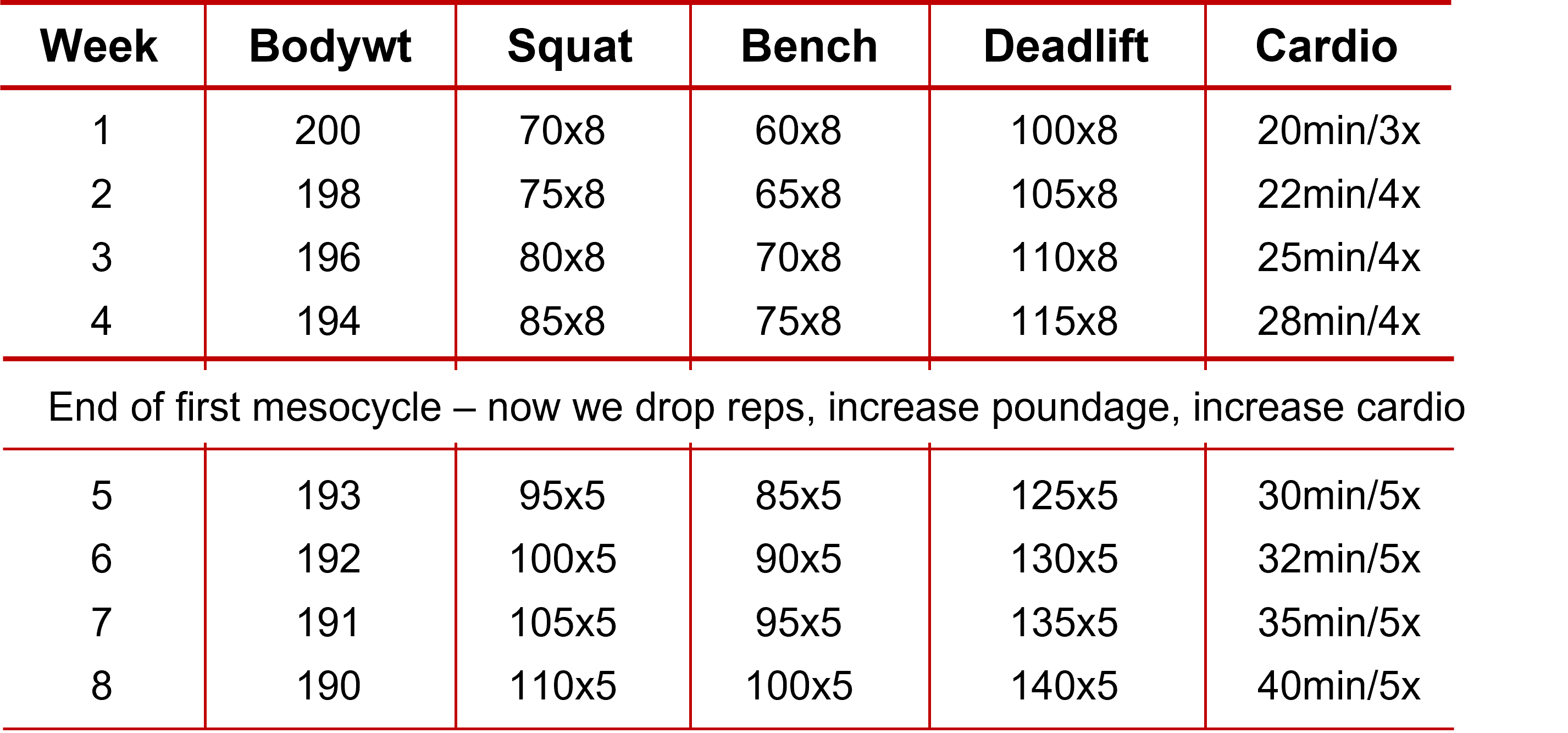
Below is a sample of periodized cardio over 10 weeks. Using the heart rate monitor mathematically the trainee can track stats and make small incremental improvements over time.
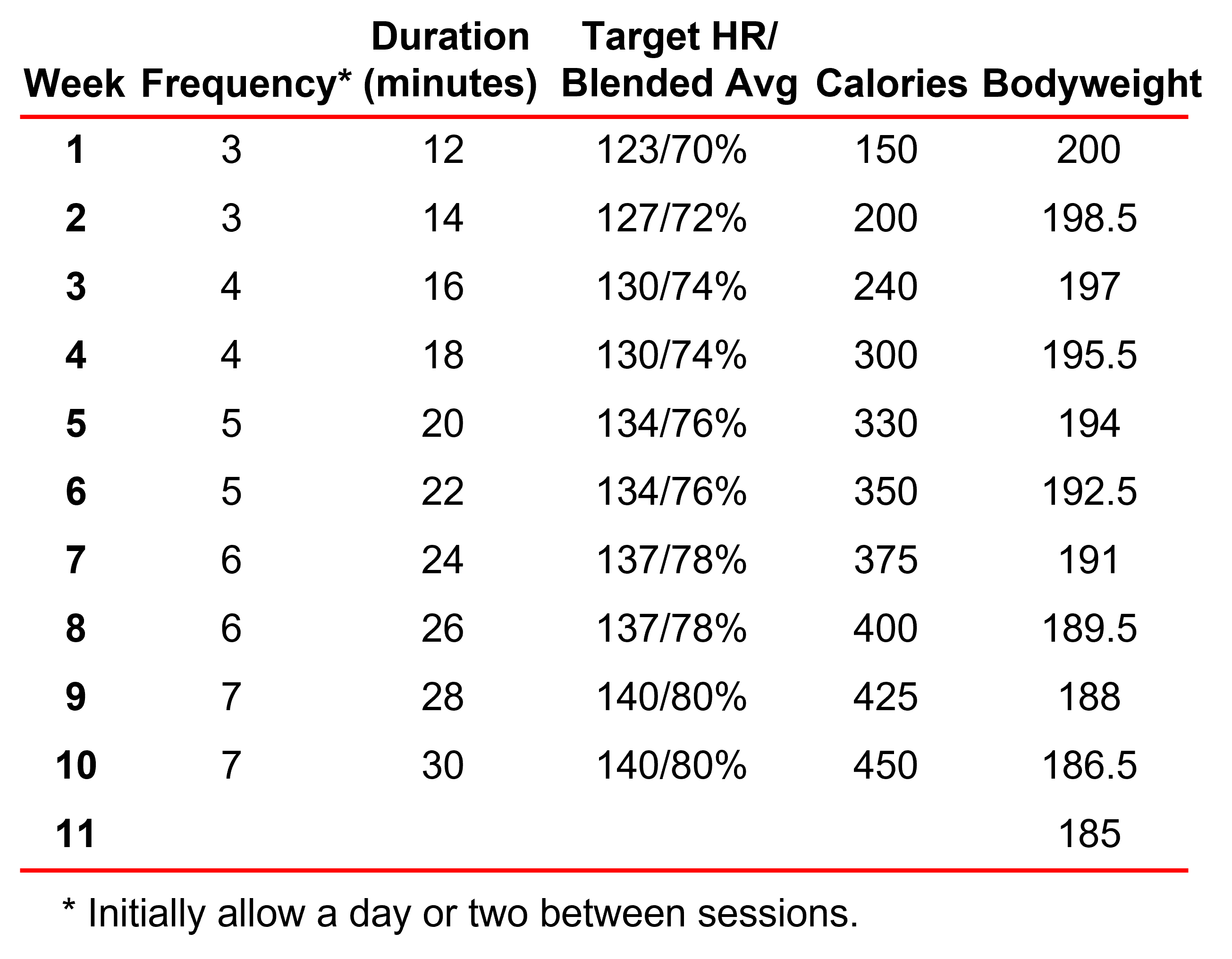
Synergy = Longevity
The synergy of these individual components creates human longevity. Our population is living longer and wanting a better quality of life later in life. Challenging ourselves to push against the tide of aging is the answer to improved functionality and happiness!
Learn more about our comprehensive transformational strategy developed from the most innovative fitness minds in the industry. Below is some additional information that you may find interesting.
Learn more about our training philosophy check out our Progressive Resistance Resource Page. Join the community sign up below to our newsletter and receive our FREE Planning and Periodization Guide.
Want the inside training scoop?
Join The Community
Our email content is full of value, void of hype, never pushy, and always free. As a BONUS you will receive our FREE planning & periodization template to help you with your training goals.

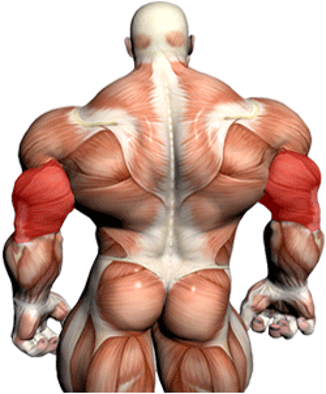



hello,
Great to find your website and read this informative post! The four transformative disciplines that you outlined are absolutely essential to make a sustainable change in health and well-being. I strongly believe that creating a transformation program requires a plan that incorporates strength training, cardio, nutrition and mental psyche. This approach has helped me greatly and I know it will also help others. I signed up for your free ecourse to improve my training plan.
Hi. You have an interesting article full of informations! Help us to have a better understanding with a full picture of it and the connection with one and another. In fact, it’s not only about training our body but our mind too!
I especially like the tao of transformation. We have to find a balance there. Just work on one side only doesn’t work. I believe it apply in everything in life. Thank you for sharing..:-)
This is full of great tips and information for keeping your body in the best condition possible, I was just curious would you change this advice for people over 60 with health problems? I was thinking most people over 60 are starting to experience a decline in their health and arthritis pain, so should someone in this situation make any changes to their workouts to stay in good condition but also prevent any risks?
Thank you,
Jeff
Actually this is exactly the advice we use with 60 year olds. We consider it anti-fragility training. There are tons of articles from PubMed to the New York Times discussing the benefits of hardcore training for older folks as a longevity tool. In addition we are currently working with elite physical therapists in instituting this kind of programming with their aging patients with great results!
This was a great, informative post on things we don’t always think about when it comes to training. Interesting to read about the four disciplines you mentioned. I’m am thin by nature, but would like to build more muscle mass. I will take these things you mentioned into consideration.
What an informative article. I love how you have the comparisons between far left and far right attributes, I had never really compared them in such a manner. It’s a pity so many people don’t train properly or get the assistance of a professional.